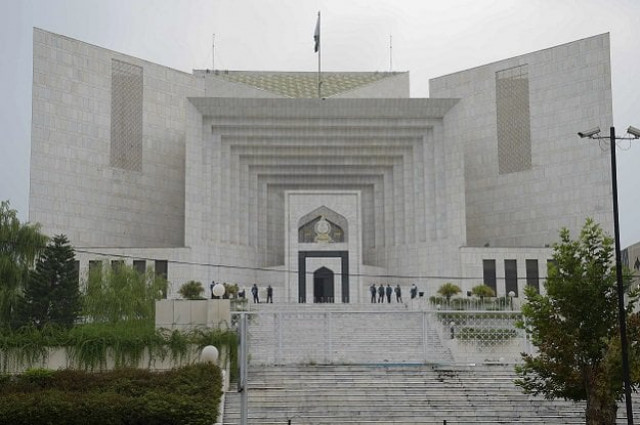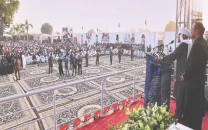SC can take suo motu action to check MPs’ credentials
Judgement upholding disqualification of PML-N MPA says court needs not wait for case to be filed

PHOTO: FILE
The three-judge bench of the top court, headed by Justice Sheikh Azmat Saeed, upheld the disqualification of former Pakistan Muslim League-Nawaz (PML-N) MPA Raja Shaukat Aziz Bhatti on account of submitting a false declaration vis-à-vis fake academic qualifications in the 2008 elections.
“We cannot abdicate our responsibility by brushing the issues floating on the surface under the carpet. Hence, we have no other option but to convert the instant proceedings into suo motu proceedings under Article 184(3) of the Constitution so as to examine the cases of the parties on the basis of the material available on record so as to examine the Order of the Election Commission of Pakistan (ECP) dated June 20, 2017 by determining whether Bhatti was…disqualified or not qualified for being a member of the provincial assembly under the Constitution,” says the 31-page judgment, authored by Justice Sheikh.
Disqualified dual-national MPs win court relief
The counsel for Bhatti had questioned the jurisdiction of the Election Commission of Pakistan (ECP) to denotify him after a lapse of 60 days from the original notification as a returned candidate.
The judge also referred to a previous verdict wherein it is held that allowing a disqualified person to become a member of parliament or of a provincial assembly would be considered as the apex court’s failure to protect and preserve the Constitution.
“Even where a matter comes before this court regarding the qualification or disqualification of a Member of the Majlis-e-Shoora or the provincial assemblies by way of proceedings other than under Article 184(3) of the Constitution, this court not only has the jurisdiction to convert such proceedings to proceedings under Article 184…but is bound to do so, as to permit an unqualified or disqualified person to continue to defile and desecrate the Majlis-e-Shoora or the Provincial Assemblies and masquerade as a chosen representative of the people would amount to frustrating the Constitutional provisions,” says the judgment.
“In such an eventuality, if this court looks the other way, it would perhaps constitute a failure to protect and preserve the Constitution,” says Justice Sheikh.
The bench had floated a question on “whether a person, who is either unqualified or disqualified under the Constitution and the law from being a member of parliament or a provincial assembly sneaks into a House, would this be considered infringement of the constitutional rights of the people of Pakistan”.
“Our constitutional dispensation is erected upon the democratic principle that the authority vest with the people of Pakistan can only be exercised through their chosen representatives. Such authority, including the power of lawmaking and control over the public exchequer, is to be conferred upon the chosen representatives by way of trust and the trust can only be reposed upon those who are worthy thereof,” says the judgment.
It adds that if no objection is raised or challenge thrown or relevant proceedings initiated before the appropriate forum at the appropriate time, the disqualification of a candidate is not cured, nor an absent qualification acquired.
“There can be no escape from the fact that if a person suffering from a pre-election disqualification or lack of qualification slips through the cracks and no objection is raised before the returning officer, no complaint is made to the ECP in terms of Section 103AA of ROPA of 1976 within the time specified, and no election petition filed before the learned election tribunal, then the inherent disqualification of such person is obviously not cured, nor can it be said that by mere absence of a challenge he acquires the qualification by lapse of time,” it says.
In such circumstances, where unqualified or disqualified person manages to escape through the net and trespass into the Majlis-e-Shoora or a provincial assembly, the constitutional jurisdiction of the learned high court under Article 199 of the Constitution and of the SC under Article 184(3) can always be invoked, says the court order.
Regarding the instant case, the verdict says that Bhatti had given a false affidavit with his nomination papers while contesting the elections held in 2008.
It also says that filing of an affidavit with the nomination papers was a requirement of the law (RoPA) and the motive for the filing of a false affidavit was to enter the provincial assembly by unfair means by making a false representation regarding the required educational qualification.
“Thus, [Bhatti] was not honest in terms of Article 62(1)(f) of the Constitution and such lack of qualification continues, so as to disentitle [Bhatti] from being a candidate for or a member of parliament or the provincial assembly,” it adds.
The court notes that no exception can be taken to the June 20, 2017 ECP order denotifying Bhatti as an MPA and “there is no cause for interference”.



















COMMENTS
Comments are moderated and generally will be posted if they are on-topic and not abusive.
For more information, please see our Comments FAQ